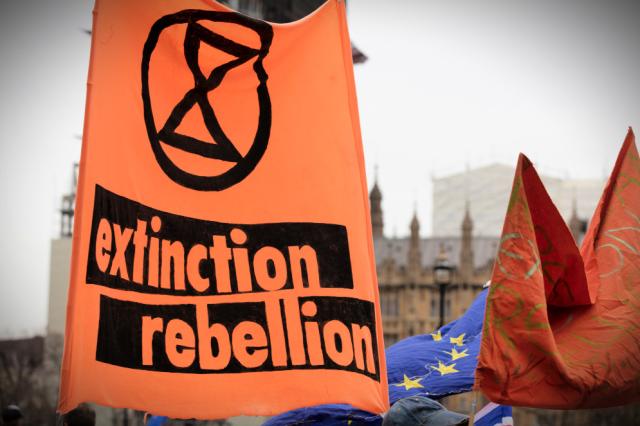
Protestors with Extinction Rebellion flags at an April 2019 protest in London. (Source: Ink Drop / Shutterstock.com)
[Editor’s note: Opinions expressed by the author are their own.]
Last week, the world’s largest fund manager BlackRock finally yielded to high-level pressure to step up its activism on matters ESG and climate. On Jan. 15 the asset manager further announced it had offloaded $500 million in shares from companies that generate a quarter or more of revenue from thermal coal.
But according to an emailed statement from Extinction Rebellion (XR) on Jan. 14, BlackRock’s decision to sign up to the Climate Action 100+ initiative isn’t enough, because:
BlackRock remains waist-deep in fossil fuel investments and the world’s top backer of companies that destroy the Amazon rainforest and ignore the rights of indigenous people. BlackRock can rest assured that we will continue to pile on the pressure until they act to protect our children and the natural world.
The comment was followed by XR’s usual stance that:
Time has almost entirely run out to address the ecological crisis which is upon us, including the sixth mass species extinction, global pollution, and abrupt, runaway climate change. Societal collapse and mass death are seen as inevitable by scientists and other credible voices, with human extinction also a possibility, if rapid action is not taken.
XR’s motives and objectives are good. But climate pressure groups like it are much more likely to inspire investor-led change if they acknowledge the bitter truth that “societal collapse and mass death” is equally likely to occur if fossil-fuel producers are deprived of financing too quickly, or are shamed into dropping core operations in favor of renewables before cost-comparable options are amply available. This is especially the case for renewable sources that aren’t yet competitive with fossil fuel (i.e. most of them) and which thus, ironically, demand the expenditure of more fossil fuel in the short term than there would otherwise be if they weren’t being manufactured at all.
Meeting the climate change challenge is essential. Obviously. But killing the patient while curing the disease is hardly optimal either. This, however, is exactly what would happen if power became prohibitively expensive to large swaths of the global population if and when oil producers buckled to pressure and suspended fossil fuel production outright or switched into more expensive options overnight.
So while diminishing fossil fuel dependence is a good objective in the long run, stigmatizing anything and everyone connected to the production of a fuel that is still vital for keeping the global economy ticking over seems the opposite of constructive. By XR’s logic, anyone even remotely connected to the industry—from coal miners to BP station retail workers—would otherwise be deprived of financing or even mortgages. This seems wrong on many levels.
The reality is, as the BP Statistical Review of World Energy shows (and no, it’s not a biased source; it’s one of the most respected statistical reports on global energy production and consumption out there) global fossil fuel consumption is still on the increase.
What’s more that global energy consumption trend is closely aligned with global GDP growth more generally.
A significant part of that consumption growth is also related to power consumed by the ICT sector. Strangely, pressure groups never seem to direct criticism at data sharing, streaming or internet indulgence the way they do activities like flying. The latter, despite it all, remains a vital tool in keeping the global logistics that feed the world from seizing up. (And we haven’t even mentioned the atrocity that is energy demand stemming from cryptocurrency, which seems equally off the radar of most of these groups.)
Even if the production of renewables was not energy-intensive in its own right (as it stands, for renewables to be cost effective they must still be produced using conventional fossil-fuel-based power), chances are closing-off the fossil-fuel tap too quickly would still hit or suspend economic growth. In such a scenario, all the positive environmental benefits that come about when countries get richer—from better waste and plastics management to reforestation drives (which the developed world is currently leading in)—would also be suspended.
Environmental writer and nuclear advocate Michael Shellenberger made these points to Alphaville very compellingly when we spoke to him last year during the peak of the Extinction Rebellion protests. Shellenberger stems from the green movement but is now often derided by the green community because he openly believes the climate problem will never be resolved with existing renewable technology.
Many, no doubt, will point us to studies that prove renewables are becoming increasingly cost-competitive with fossil fuel, or direct us to research that shows how problematic nuclear is in its own right. This may be the case. But it doesn’t change the immediate challenge at hand, which is that the world needs to both lower emissions quickly and maintain economic growth as it is. Achieving the first at the cost of the latter will do little to lower the risk of global societal collapse.
Our energy-intensive tools, systems and infrastructure cannot be replaced with lower energy intensive alternatives overnight. Even if they could, we need to face up to the fact replacing them in one-go would be a hugely energy intensive exercise. By bringing forward energy demand that would otherwise be distributed into the future it would also ironically lead to more short-term emissions not less.
Last of all, policymakers and activists cannot ignore the risk that Jevons paradox might hold true regardless. This would see any energy efficiency gained from new systems entirely offset by increased demand.
Sadly, we don’t have the solution to this problem. But flagging it is important to ensure the ESG movement more widely doesn’t inadvertently trigger an economic wobble by pulling financing from the fossil fuel industry prematurely. The immediate boycott of the fossil fuel industry in investing circles may seem the most green thing to do, but until a cost-effective energy solution that allows society to both stave off global warming and economic collapse is found, it might make things worse rather than better for the world’s most energy-poverty exposed.
Recommended Reading
Texas LNG Export Plant Signs Additional Offtake Deal With EQT
2024-04-23 - Glenfarne Group LLC's proposed Texas LNG export plant in Brownsville has signed an additional tolling agreement with EQT Corp. to provide natural gas liquefaction services of an additional 1.5 mtpa over 20 years.
US Refiners to Face Tighter Heavy Spreads this Summer TPH
2024-04-22 - Tudor, Pickering, Holt and Co. (TPH) expects fairly tight heavy crude discounts in the U.S. this summer and beyond owing to lower imports of Canadian, Mexican and Venezuelan crudes.
What's Affecting Oil Prices This Week? (April 22, 2024)
2024-04-22 - Stratas Advisors predict that despite geopolitical tensions, the oil supply will not be disrupted, even with the U.S. House of Representatives inserting sanctions on Iran’s oil exports.
Association: Monthly Texas Upstream Jobs Show Most Growth in Decade
2024-04-22 - Since the COVID-19 pandemic, the oil and gas industry has added 39,500 upstream jobs in Texas, with take home pay averaging $124,000 in 2023.
Shipping Industry Urges UN to Protect Vessels After Iran Seizure
2024-04-19 - Merchant ships and seafarers are increasingly in peril at sea as attacks escalate in the Middle East.



